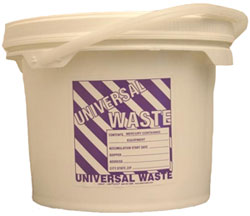
Auto manufacturers, as part of a national, voluntary, agreement, will provide collection containers and free recycling of recovered switches to vehicle recyclers until December 31, 2027. This will continue to be done through the end-of-life vehicle solutions (ELVS) program. Mercury switches are required to be removed prior to delivery to a scrap recycling facility.
Send in your bucket! When your collection bucket is full, sent it in.
- If needed, request a replacement bucket and shipping label by calling (800) 495-6059 or e-mail elvsbuckets@usecology. Provide your company name, shipping address and bucket size (small or large).
- Enclose the log of make and model numbers or VINs in the collection container.
- Tie the plastic liner in a knot and tightly seal the container.
EQ – A US Ecology Company (formerly EQ Industrial Services, Inc.)
Attention: ELVS program
6500 Georgia street
Detroit, MI 48211
(800) 495-6059
- Give the sealed and labeled box to your UPS driver when at your facility. If you do not have visits from a UPS driver, simply drop off your package at the nearest UPS drop off outlet (a list of outlets are available on the web at www.ups.com).
- ELVS will properly manage the mercury switches.
For a list of vehicles containing mercury switches, videos on how to remove the switches and various other information, visit the ELVS website.
DNR contact
Theresa Stiner
515-721-7979
Theresa.Stiner@dnr.iowa.gov